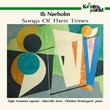| All Artists: Zinka Milanov Title: Sings Bellini & Verdi Members Wishing: 0 Total Copies: 0 Label: RCA Release Date: 4/20/1990 Genres: Pop, Classical Styles: Vocal Pop, Opera & Classical Vocal, Historical Periods, Modern, 20th, & 21st Century Number of Discs: 1 SwapaCD Credits: 1 UPC: 090266007424 |
Search - Zinka Milanov :: Sings Bellini & Verdi
 | Zinka Milanov Sings Bellini & Verdi Genres: Pop, Classical
|
CD DetailsSimilar CDs
|
CD ReviewsVery exciting BDSinC | Calgary, Alberta, Canada | 09/02/2004 (5 out of 5 stars) "Zinka Milanov is a singer I came to in my youth, but through her recordings, as I never had the occasion to hear her on stage, nor to hear her in any Metropolitan Opera Broadcasts. The first recording I ever had was Verdi's "La Forza." I have heard many recordings of the work since then (my only other favorite version is an earlier one with Leontyne Price, not the later version she rerecorded), but Milanov has put her permanent stamp on that work for me. So when I found this recording I was interested in it, as she was singing Verdi, which I expected she would do well, but also Bellini, which I never knew she ever sang. I have to admit, I listened with a bit of skepticism. I was used to hearing Norma by Callas, Sutherland, Caballe, Sills, and those people we now associate with bel canto. In comparision, Milanov is not in the same class as far as florid singing is concerned, but by no means is she trashy at it either. Her trill is more an illusion than an actuality, but it is still there. The voice seems heavy in comparision to what we have grown accustomed to, but by no means does it sound labored or strained, or even uncomfortable with florid work. I was incredibly surprised, and actually very delighted with what I heard. I look forward to acquiring her recording of Norma. What really caught me was the depth of sound, not only in her intensity in the dramatic recitatives (Trovatore aria), but in the quality of the sound itself. She nearly has a "contralto chest register." It seems such a well balanced and well developed middle and lower voice was common amongst dramatic sopranos of her day, and in my view, the music is greatly benefitted by that quality. I truly feel her magical high pianissimi are given great warmth all because of this extremely well balanced quality of her voice, also, at no time does one ever feel or consider any strain in anything she is singing. I never heard her in person, so I really don't know for sure how large her voice really was, but this recording gives the impression that it could be very large, and it was recorded back in the days when the voice was not a creation of technology. I feel this recording is excellent, and well worth the price. We are hearing singing from the "golden age of opera" (there have been many of them, so one has to decide which golden age, for her singing extended from before the 50's and lasted into the 60's). One thing we do hear is a foundation in the voice. This voice is well grounded and it is filled with emotion. Often today, voices are extremely small, and often very light (almost even too light for Mozart!), and more often than not, the lower ranges of the voice are not well developed if at all. Though high notes may be powerful and glorious, the warmth, the human emotional quality is lacking, and we are left with a faceless meaningless even if extremely beautiful reading of the scores. With Milanov's warmth of tone, we are experiencing a human being expressing human feelings, not a bird, or a mechanical device imitating the human voice; again, the music is improved upon by this wonderful addition of quality. It is an exellent recording, and I recommend it." Merely exquisite Justin M. Trifiro | Wethersfield, CT United States | 07/07/2004 (5 out of 5 stars) "milanov, not atypical of the second golden age of opera, possessed a callas-esque temperment and a voice of astonishing depth. her reading of the Rusalka aria is beguiling. presented here is the 'whooping' glow associated with the milanov timbre. this project is a treasure. on a every piece, milanov sings with great aplomb and conveys brilliantly the pathos of classic histrionic heroines. brava."
|

 Track Listings (15) - Disc #1
Track Listings (15) - Disc #1
